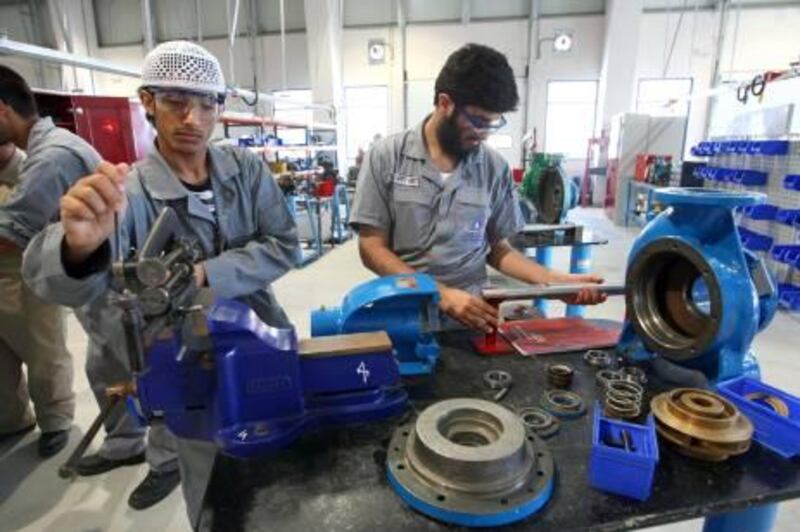Abu Dhabi National Oil Company (ADNOC)expects to add about 7,500 new jobs by 2015, as the group ramps up its capacity to produce oil, gas and petrochemicals.
At present about 25,000 people work for the ADNOC group, which includes a holding company owned by the Government and 14 units that operate in all sectors of the oil and gas industry. These range from resources extraction and oilfield services to processing, refining and chemicals production, to the marketing and distribution of end products including fuels, plastics and fertilisers.
"For ADNOC across the board, we're talking about 30 per cent growth in production and workforce in the next five years," Ali al Jarwan, the chief executive of Abu Dhabi Company for Marine Operating Company (Adma-Opco), said yesterday at a meeting of GCC national oil companies in Abu Dhabi.
The new employees would be overwhelmingly Emirati, recruited mainly from the ADNOC Technical Institute and the Petroleum Institute. Respectively, these are a vocational college and a specialised university that ADNOC founded with industry and academic partners to meet its future requirements for technical staff.
Badria Khalfan, the ADNOC deputy director for human resources and administration, said the company set a target of increasing its percentage of Emirati employees to 75 per cent by 2014 from its present level of just over 50 per cent.
To attain that goal while boosting its total workforce to about 32,500 by the end of 2014, the company would need to add almost 12,000 new Emirati employees, nearly doubling its current number, and replace thousands of its current expatriate workers with UAE nationals.
Ms Khalfan said about 4 per cent of ADNOC employees leave the company each year for various reasons, including retirement. If that stays constant over the next five years, ADNOC would need to hire more than 6,000 new employees just to replace those leaving. All told, it could have nearly 14,000 staff openings between now and the end of 2015, or as many as 2,800 positions per year.
ADNOC has also announced plans to increase its total oil production capacity to 3.5 million barrels per day (bpd) by 2018 from about 2.8 million bpd at present, at the same time also raising its gas output.
As part of that plan, Adma-Opco, an offshore oil consortium 60 per cent owned by ADNOC and 40 per cent by international oil companies, is seeking to develop two untapped oilfields, Umm al Lulu and Nasr, off Abu Dhabi's Gulf coast. It expects to start pumping 22,500 bpd from each in 2015.
Over the longer term, it is seeking to add 300,000 bpd of new oil output from at least four offshore deposits that are smaller than its current mainstays, the giant Umm Shaif and Lower Zakum oilfields.
Adma-Opco is also nearing the completion of a three-year project to boost output from Umm Shaif, as it embarks on a five-year scheme to do likewise at Lower Zakum.
Each of ADNOC's other two main oil production joint ventures, one pumping oil from Abu Dhabi's onshore fields and the other from its giant Upper Zakum offshore oil deposit, also have expansion programmes of comparable scope. The companies have already awarded contracts worth tens of billions of dirhams to construction and oil services firms to start implementing major projects.
The ADNOC chemicals joint venture Borouge and its fertiliser unit Fertil are also in the middle of major expansions, despite glutted markets for their products.
"We in ADNOC have not designed our strategy based on today's environment. We have a very clear long-term strategy and we always focus on implementing those strategies," Yousef Omair bin Yousef, the ADNOC chief executive, said this month.
Ms Khalfan said yesterday ADNOC's hiring plans were in keeping with the long-term economic development policy of the Abu Dhabi Government.
"Having a skilled workforce is at the top of our leaders' agenda in Abu Dhabi and is part of Vision 2030," she said, referring to the Government's development master plan.





